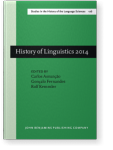Polysemy in 19th century linguistic studies in Chile
Attitudes and ideology
This paper analyzes the attitudes towards polysemy in the works of Chilean Spanish-speaking grammarians and lexicographers from the nineteenth century. These attitudes are mainly negative: the authors consider that words should have only one meaning (the “proper” meaning). Such a belief can be best understood within the frame of standard language ideology. As this language ideology aims for reduction of linguistic variation, the existence of semasiological variation (i.e., polysemy) becomes the subject of negative evaluation. Moreover, we underline the political motivations of such ideology and attitudes towards polysemy.
